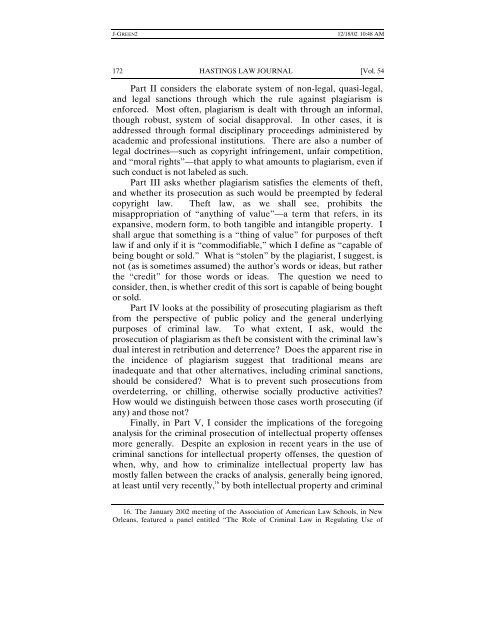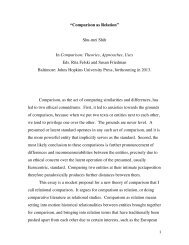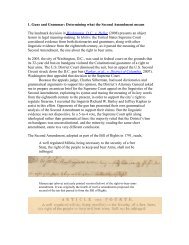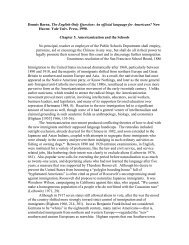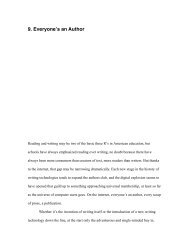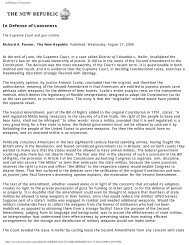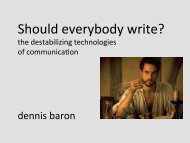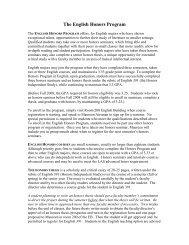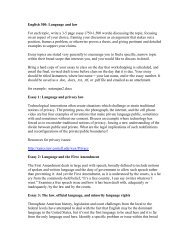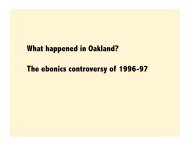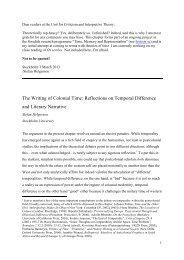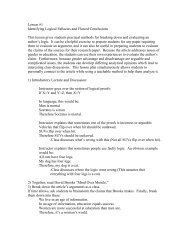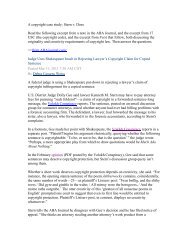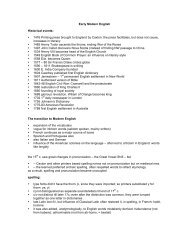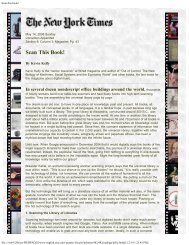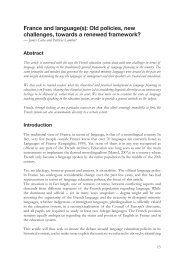Plagiarism, Norms, and the Limits of Theft Law: Some ... - English
Plagiarism, Norms, and the Limits of Theft Law: Some ... - English
Plagiarism, Norms, and the Limits of Theft Law: Some ... - English
You also want an ePaper? Increase the reach of your titles
YUMPU automatically turns print PDFs into web optimized ePapers that Google loves.
J-GREEN2 12/18/02 10:48 AM<br />
172 HASTINGS LAW JOURNAL [Vol. 54<br />
Part II considers <strong>the</strong> elaborate system <strong>of</strong> non-legal, quasi-legal,<br />
<strong>and</strong> legal sanctions through which <strong>the</strong> rule against plagiarism is<br />
enforced. Most <strong>of</strong>ten, plagiarism is dealt with through an informal,<br />
though robust, system <strong>of</strong> social disapproval. In o<strong>the</strong>r cases, it is<br />
addressed through formal disciplinary proceedings administered by<br />
academic <strong>and</strong> pr<strong>of</strong>essional institutions. There are also a number <strong>of</strong><br />
legal doctrines—such as copyright infringement, unfair competition,<br />
<strong>and</strong> “moral rights”—that apply to what amounts to plagiarism, even if<br />
such conduct is not labeled as such.<br />
Part III asks whe<strong>the</strong>r plagiarism satisfies <strong>the</strong> elements <strong>of</strong> <strong>the</strong>ft,<br />
<strong>and</strong> whe<strong>the</strong>r its prosecution as such would be preempted by federal<br />
copyright law. <strong>Theft</strong> law, as we shall see, prohibits <strong>the</strong><br />
misappropriation <strong>of</strong> “anything <strong>of</strong> value”—a term that refers, in its<br />
expansive, modern form, to both tangible <strong>and</strong> intangible property. I<br />
shall argue that something is a “thing <strong>of</strong> value” for purposes <strong>of</strong> <strong>the</strong>ft<br />
law if <strong>and</strong> only if it is “commodifiable,” which I define as “capable <strong>of</strong><br />
being bought or sold.” What is “stolen” by <strong>the</strong> plagiarist, I suggest, is<br />
not (as is sometimes assumed) <strong>the</strong> author’s words or ideas, but ra<strong>the</strong>r<br />
<strong>the</strong> “credit” for those words or ideas. The question we need to<br />
consider, <strong>the</strong>n, is whe<strong>the</strong>r credit <strong>of</strong> this sort is capable <strong>of</strong> being bought<br />
or sold.<br />
Part IV looks at <strong>the</strong> possibility <strong>of</strong> prosecuting plagiarism as <strong>the</strong>ft<br />
from <strong>the</strong> perspective <strong>of</strong> public policy <strong>and</strong> <strong>the</strong> general underlying<br />
purposes <strong>of</strong> criminal law. To what extent, I ask, would <strong>the</strong><br />
prosecution <strong>of</strong> plagiarism as <strong>the</strong>ft be consistent with <strong>the</strong> criminal law’s<br />
dual interest in retribution <strong>and</strong> deterrence? Does <strong>the</strong> apparent rise in<br />
<strong>the</strong> incidence <strong>of</strong> plagiarism suggest that traditional means are<br />
inadequate <strong>and</strong> that o<strong>the</strong>r alternatives, including criminal sanctions,<br />
should be considered? What is to prevent such prosecutions from<br />
overdeterring, or chilling, o<strong>the</strong>rwise socially productive activities?<br />
How would we distinguish between those cases worth prosecuting (if<br />
any) <strong>and</strong> those not?<br />
Finally, in Part V, I consider <strong>the</strong> implications <strong>of</strong> <strong>the</strong> foregoing<br />
analysis for <strong>the</strong> criminal prosecution <strong>of</strong> intellectual property <strong>of</strong>fenses<br />
more generally. Despite an explosion in recent years in <strong>the</strong> use <strong>of</strong><br />
criminal sanctions for intellectual property <strong>of</strong>fenses, <strong>the</strong> question <strong>of</strong><br />
when, why, <strong>and</strong> how to criminalize intellectual property law has<br />
mostly fallen between <strong>the</strong> cracks <strong>of</strong> analysis, generally being ignored,<br />
at least until very recently, 16 by both intellectual property <strong>and</strong> criminal<br />
16. The January 2002 meeting <strong>of</strong> <strong>the</strong> Association <strong>of</strong> American <strong>Law</strong> Schools, in New<br />
Orleans, featured a panel entitled “The Role <strong>of</strong> Criminal <strong>Law</strong> in Regulating Use <strong>of</strong>


